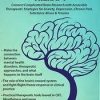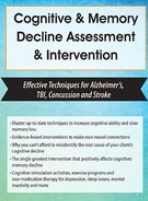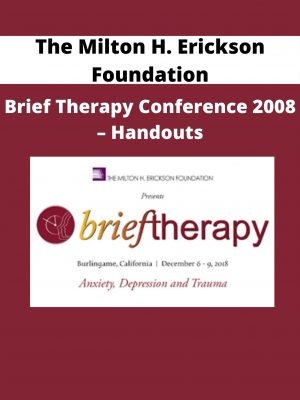Maxwell Perkins – Cognitive & Memory Decline Assessment & Intervention
$219 Original price was: $219.$62Current price is: $62.
Shopping Instructions:
- DISCOUNT 15% : SHOP15
- Product Delivery: Within 1 – 12 hours after purchase.
Available for Pre-Order. This product will be available within a few days.
Maxwell Perkins – Cognitive & Memory Decline Assessment & Intervention
Cognition and Memory: Clinical Examples
- Normal vs. abnormal memory/cognitive decline
- Mild Cognitive impairments (MCI) vs. Mild Alzheimer’s disease (AD)
- Relationship to Executive Functions (EF)
- Frontal lobe and attention: The impact of TBI, CVA, MCI
- Delirium: The importance of identification and treatment
Cognitive & Memory Intervention For Alzheimer’s * TBI * Concussion * Stroke
Co-Morbidities/Reversible Factors Affecting Cognitive/Memory Function and How to Intervene
- Depression: Assessments, non-medication therapy, referral needs
- Sleep issues: Sleep hygiene program, environmental strategies
- Mental/physical inactivity: Cognitive stimulation activities, exercise programs/guidelines
- Vision and hearing loss: Age related impact, sharpen your observational skills
- The Hippocampus: Latest research and how to influence age related changes
- Marijuana: Use of and impact on cognition/memory
Cognitive Assessments: Hands-on Activities
- Quickly identify mild cognitive/memory changes/deficits
- Choose the best assessments to use for specific issues/areas
- Limitations and strengths of assessments used for cognitive functioning
Interventions for Managing Cognitive/Memory Decline
- Computer-based Cognitive Training: What does the evidence say?
- Spaced Retrieval: Incorporate into treatment, baseline for client education
- Compensatory strategies: Lists, calendars, skill set money management
- Physical exercise: Best type, program implementation strategies
- Communication: Effective stage appropriate strategies, environmental factors
Interventions for Independence, Mobility, Safety and other ADLS/IADLs
- Falls: Computer-based training, decrease risk, dual tasking
- Driving: Clinical assessment tools, strategies for cessation of driving, state requirements
- Medication administration: Strategies for adherence, caregiver training
- Home management: Adaptive equipment, strategies for home safety, appropriate discharge environment to assure safety and highest functional level
- Communication: Strategies for working with physicians and caregivers
Would you like to receive Maxwell Perkins – Cognitive & Memory Decline Assessment & Intervention ?
Description:
Often overlooked, many co-morbidities and reversible factors can complicate accurate identification of the root cause of your client’s cognitive/memory decline – leading you down a frustrating treatment path that fails to get results.
This dynamic and interactive training recording will leave you confident in your ability to intervene with cognitive/memory decline related to early stage Alzheimer’s, Traumatic Brain Injury (TBI), concussion, Cerebral Vascular Accidents (CVA’s) and Mild Cognitive Impairment (MCI).
You will learn the latest evidence-based assessment and treatment interventions for cognitive/memory impairment as well as master the insight necessary to select the most appropriate interventions and safe discharge environments. We will also discuss the impact of ethnicity, education level, obesity, diabetes and other contributing factors that must be considered in the intervention of cognitive/memory decline.
Watch and you will learn:
- Cognitive, stimulation activities, exercise programs and non-medication therapy for depression, sleep issues and mental inactivity
- Computer-based cognitive training, compensatory strategies, spaced retrieval and effective and safe environmental interventions
- Assessments for executive function, fall risk, driving ability and overall safety
- Evidence-based interventions to make new neural connections
- How to prioritize treatment sessions to focus on your client’s functional deficits
- Effective communication strategies for dealing with clients, families, peers and MD’s
The negative implications of misaligned client assessment and treatment interventions are far too important for you to be uncertain and unprepared.
Related products
HEALTH & MEDICAL
HEALTH & MEDICAL
Dr. J.E. Williams & Kevin Gianni – How to Read Your Blood Tests
HEALTH & MEDICAL
HEALTH & MEDICAL
HEALTH & MEDICAL
Gaia—Creating-High-Voltage-Health-with-Glenn-Streeter-Open-Minds
HEALTH & MEDICAL












